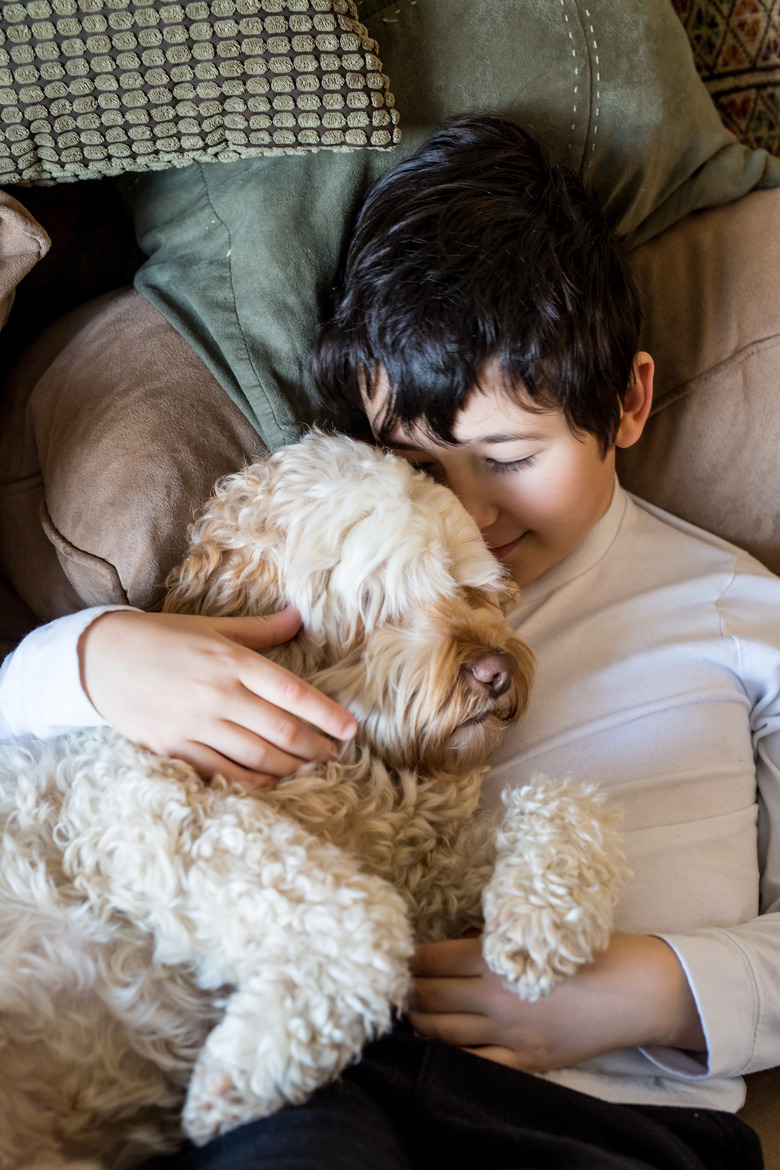Do Dogs Feel Love And Hate?
One of the reasons dogs are such popular pets is the perception that they love us unconditionally. They greet us upon our return home with a friendly tail wagging or by even jumping around excitedly. They forgive our grouchy mood and cuddle with us when we're sad. Although we can personify our dogs with emotions such as love and hate, science is only beginning to uncover how dogs really feel.
Dogs are wired for emotion
Dogs are wired for emotion
Dog brains and human brains have a lot in common. In fact, dogs have all the same mechanical systems in their brains as humans. This includes the limbic system, which is responsible for emotion. However, dog brains don't have the same amount of internal neural structure in their brain as humans do. Humans have a much larger encephalization quotient (EQ) — the amount of brain mass compared to body size — than dogs. Whereas dogs have a slightly large brain size for their body at an EQ of 1.2, humans have an EQ of 7.
A dog's limbic system functions just like a human's and contains the same components. The amygdala is responsible for fear, aggression, and resentment. The resulting dog actions of barking, growling, avoiding someone, or even biting could be interpreted by humans as hate. The limbic system also affects the autonomic nervous system, which, for example, might result in your dog not being able to eat, drink, or poop when you're gone and he's missing you.
As dogs experience the world differently than humans, it's inaccurate to ascribe truly human emotions to them. Dogs see the world from a different perspective, obviously, and their large olfactory system means they're taking in information and processing it much differently than humans. Certainly, your dog experiences definite affection for you, as evidenced by the dog's brain "lighting up" when smelling his human's scent compared to other dogs or strangers.
Dog language of emotions
Dog language of emotions
Dogs express their emotions through body language and sometimes sounds. The obvious signs your dog is feeling love and affection toward you include cuddling, wanting to be near you at all times, and greeting you when you return. Some dogs seem equally excited to see just about anyone, while other dogs are loyal to just their own special humans. Likewise, dogs might growl or walk away stiff-legged when someone they don't like comes into the room.
Some canine expressions of emotion are more subtle. Small changes in the position of the ears or the softness of the eyes can signal a shift in emotion. Your dog's relaxed eyelids probably make her look like she's squinting as she cuddles happily by your side. However, if someone who has treated her unkindly walks into the room, those eyes might become round and show the whites while following that person's every move. Known as "whale eye," this is a sure sign that your dog is stressed or anxious about that person's presence.
You can easily tell whether your dog is into a person's presence by the dog's body position. A snuggly dog who presses her head against you in a canine hug is definitely feeling the love. A dog who leans away or points her snout away from you while you're trying to cuddle her is tolerating you at best and would rather be elsewhere. A wagging tail might be the traditional sign that a dog likes you, but it merely signifies that the dog is excited and should be interpreted in the context of her other body language.
A change of emotions
A change of emotions
Don't read too much into your dog's mild love or hate reactions. Even though many dogs seem happy-go-lucky as their default setting, they experience ranges of moods just like humans. If your dog regularly comes running to the door to greet you but chooses to stay in bed one day, it's unlikely that you've done anything wrong. He may be tired or sore from the long hike you took yesterday, or he could be feeling ill. Check with your vet if your dog seems out of sorts, as this is usually your first clue to any health issues.
Likewise, a dog might have an initial negative reaction to someone who doesn't smell right to him or approaches him in a manner that intimidates him. It might be that your dog is having an off day and doesn't feel like interacting with anyone but you. Give your dog and the new person a chance and don't automatically assume that your dog hates the person if he doesn't show instant signs of affection.
